by Deep Green Resistance News Service | May 20, 2017 | Colonialism & Conquest
Featured image: Indigenous protests in Brasilia, April 2017. © VOA
by Survival International
An inquiry established by Brazilian parliamentarians who represent the powerful agribusiness lobby has just published a report calling for the closure of the Indian Affairs Department, FUNAI.
Its findings have been met with outrage and incredulity in Brazil and beyond. Francisco Runja, a Kaingang spokesman said: “Killing off FUNAI is tantamount to killing us, the indigenous peoples. FUNAI is a crucial institution for us; our survival; our resistance; and it’s a guarantee of the demarcation of our traditional territories.”
The report attacks indigenous leaders, anthropologists, public prosecutors and NGOs, including Survival International.
It alleges that FUNAI has become a “hostage to external interests” and calls for dozens of its officials to be prosecuted for backing what it calls “illegal demarcations” of tribal territories.
Yesterday a group of 50 Indians was barred from attending the session in congress discussing the inquiry.
The inquiry took 500 days and the report is over 3,300 pages long. It is a blatant attack on indigenous peoples and a crude and biased attempt to destroy their hard-won constitutional rights.

Mutilated indigenous victim of ranchers’ attack in May 2017. © Anon
It was headed by politicians representing Brazil’s powerful agri-businesses who have long coveted indigenous territories for their own financial gain.
One member, congressman Luis Carlos Heinze, received Survival’s Racist of the Year award in 2014 following his deeply offensive remarks about Brazilian Indians, homosexuals, and black people.
Another member, congressman Alceu Moreira, called for the eviction of tribal people attempting to reoccupy their ancestral lands.
The increasingly hostile, anti-indigenous climate in many sectors in congress is fuelling violence against indigenous peoples. Last month, 22 Gamela Indians were injured following a brutal attack at the hands of local landowners’ gunmen.
FUNAI has suffered severe budget cuts, which have resulted in the grounding of several teams responsible for protecting uncontacted tribes’ territories. This effectively leaves some of the most vulnerable people on the planet to the mercy of armed loggers and land grabbers.
The organization has been greatly weakened. Many staff have been made redundant, and political appointees now run key departments.
In the last five months, it has had three presidents. Earlier this month the second president, Antonio Costa was dismissed. In a press conference he strongly criticized President Temer and Osmar Serraglio, the Minister of Justice, stating that they “not only want to finish off FUNAI, but also public policies such as demarcation of [indigenous] land… This is very serious.”
Yanomami shaman and spokesman Davi Kopenawa said: “FUNAI is broken… it is already dead. They killed it. It only exists in name. A nice name, but it doesn’t have the power to help us.”

by Deep Green Resistance News Service | May 19, 2017 | Lobbying
by Center for Biological Diversity
TUCSON, AZ— President Trump’s border wall threatens 93 endangered and threatened species, including jaguars, ocelots, Mexican gray wolves and cactus ferruginous pygmy owls, according to a new study by the Center for Biological Diversity.
The study also found that 25 threatened or endangered species have designated “critical habitat” on the border, including more than 2 million acres within 50 miles of the border.
“Trump’s border wall is a disaster for people and wildlife alike,” said Noah Greenwald, endangered species director at the Center. “It could drive magnificent species like the jaguar and ocelot to extinction in the United States.”
The new study identified all threatened, endangered and “candidate” species (those being considered for protection) that have ranges near or crossing the border. These include 57 endangered species, 24 threatened species, 10 species under consideration for protection and two species of concern, golden and bald eagles. Construction of Trump’s 1,200-mile wall — along with related infrastructure and enforcement — will have far-reaching consequences for wildlife, including cutting off migration corridors, reducing genetic diversity, destroying habitat, and adding vehicles, noise and lights to vast stretches of the wild borderlands.
“The border wall won’t be effective at stopping people seeking a better life from getting to this country, but it will destroy habitat and divide wildlife populations,” Greenwald said. “Building a wall across the entirety of the border would cause massive damage to one of the most biologically diverse regions in North America and would be a boondoggle of the highest order.”
The sections of border wall that have already been built have had a range of negative effects on wildlife, including direct destruction of thousands of acres of habitat, indirect impacts from noise and light pollution, and division of cross-border wildlife populations like bighorn sheep and jaguars. The border wall would cut through the Cabeza Prieta, Buenos Aires and several other national wildlife refuges, along with Organ Pipe Cactus National Monument, Big Bend National Park and many other natural areas that, besides acting as corridors for wildlife, are national treasures.
Last month the Center and Congressman Raúl M. Grijalva (D-Ariz.), the ranking member of the House Committee on Natural Resources, sued the Trump administration over the proposed border wall and other border security measures, calling on federal agencies to conduct an in-depth investigation of the proposal’s environmental impacts.
The suit, filed in the U.S. District Court for the District of Arizona, is the first targeting the Trump administration’s plan to vastly expand and militarize the U.S.-Mexico border, including construction of a “great wall.”
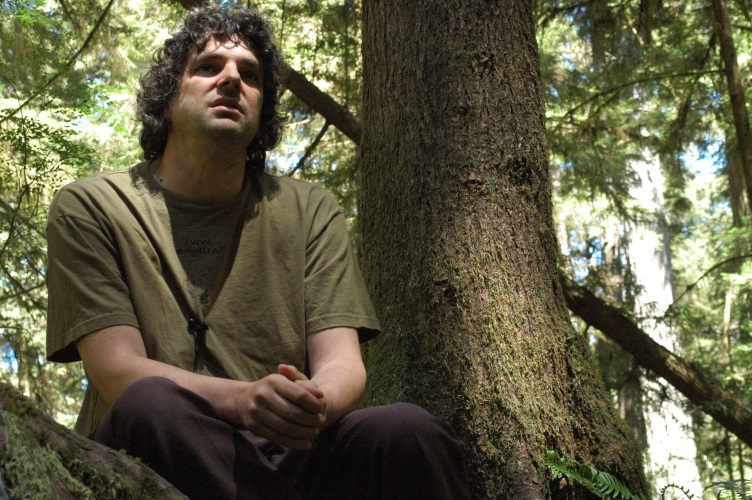
by DGR Editor | May 17, 2017 | Mining & Drilling, Strategy & Analysis
Why personal change does not equal political change
by Derrick Jensen / Deep Green Resistance
Would any sane person think dumpster diving would have stopped Hitler, or that composting would have ended slavery or brought about the eight-hour workday, or that chopping wood and carrying water would have gotten people out of Tsarist prisons, or that dancing naked around a fire would have helped put in place the Voting Rights Act of 1957 or the Civil Rights Act of 1964? Then why now, with all the world at stake, do so many people retreat into these entirely personal “solutions”?
Part of the problem is that we’ve been victims of a campaign of systematic misdirection. Consumer culture and the capitalist mindset have taught us to substitute acts of personal consumption (or enlightenment) for organized political resistance. An Inconvenient Truth helped raise consciousness about global warming. But did you notice that all of the solutions presented had to do with personal consumption — changing light bulbs, inflating tires, driving half as much — and had nothing to do with shifting power away from corporations, or stopping the growth economy that is destroying the planet? Even if every person in the United States did everything the movie suggested, U.S. carbon emissions would fall by only 22 percent. Scientific consensus is that emissions must be reduced by at least 75 percent worldwide.
Or let’s talk water. We so often hear that the world is running out of water. People are dying from lack of water. Rivers are dewatered from lack of water. Because of this we need to take shorter showers. See the disconnect? Because I take showers, I’m responsible for drawing down aquifers? Well, no. More than 90 percent of the water used by humans is used by agriculture and industry. The remaining 10 percent is split between municipalities and actual living breathing individual humans. Collectively, municipal golf courses use as much water as municipal human beings. People (both human people and fish people) aren’t dying because the world is running out of water. They’re dying because the water is being stolen.
Or let’s talk energy. Kirkpatrick Sale summarized it well: “For the past 15 years the story has been the same every year: individual consumption — residential, by private car, and so on — is never more than about a quarter of all consumption; the vast majority is commercial, industrial, corporate, by agribusiness and government [he forgot military]. So, even if we all took up cycling and wood stoves it would have a negligible impact on energy use, global warming and atmospheric pollution.”
Or let’s talk waste. In 2005, per-capita municipal waste production (basically everything that’s put out at the curb) in the U.S. was about 1,660 pounds. Let’s say you’re a die-hard simple-living activist, and you reduce this to zero. You recycle everything. You bring cloth bags shopping. You fix your toaster. Your toes poke out of old tennis shoes. You’re not done yet, though. Since municipal waste includes not just residential waste, but also waste from government offices and businesses, you march to those offices, waste reduction pamphlets in hand, and convince them to cut down on their waste enough to eliminate your share of it. Uh, I’ve got some bad news. Municipal waste accounts for only 3 percent of total waste production in the United States.
I want to be clear. I’m not saying we shouldn’t live simply. I live reasonably simply myself, but I don’t pretend that not buying much (or not driving much, or not having kids) is a powerful political act, or that it’s deeply revolutionary. It’s not. Personal change doesn’t equal social change.
So how, then, and especially with all the world at stake, have we come to accept these utterly insufficient responses? I think part of it is that we’re in a double bind. A double bind is where you’re given multiple options, but no matter what option you choose, you lose, and withdrawal is not an option. At this point, it should be pretty easy to recognize that every action involving the industrial economy is destructive (and we shouldn’t pretend that solar photovoltaics, for example, exempt us from this: they still require mining and transportation infrastructures at every point in the production processes; the same can be said for every other so-called green technology). So if we choose option one — if we avidly participate in the industrial economy — we may in the short term think we win because we may accumulate wealth, the marker of “success” in this culture. But we lose, because in doing so we give up our empathy, our animal humanity. And we really lose because industrial civilization is killing the planet, which means everyone loses. If we choose the “alternative” option of living more simply, thus causing less harm, but still not stopping the industrial economy from killing the planet, we may in the short term think we win because we get to feel pure, and we didn’t even have to give up all of our empathy (just enough to justify not stopping the horrors), but once again we really lose because industrial civilization is still killing the planet, which means everyone still loses. The third option, acting decisively to stop the industrial economy, is very scary for a number of reasons, including but not restricted to the fact that we’d lose some of the luxuries (like electricity) to which we’ve grown accustomed, and the fact that those in power might try to kill us if we seriously impede their ability to exploit the world — none of which alters the fact that it’s a better option than a dead planet. Any option is a better option than a dead planet.
Besides being ineffective at causing the sorts of changes necessary to stop this culture from killing the planet, there are at least four other problems with perceiving simple living as a political act (as opposed to living simply because that’s what you want to do). The first is that it’s predicated on the flawed notion that humans inevitably harm their landbase. Simple living as a political act consists solely of harm reduction, ignoring the fact that humans can help the Earth as well as harm it. We can rehabilitate streams, we can get rid of noxious invasives, we can remove dams, we can disrupt a political system tilted toward the rich as well as an extractive economic system, we can destroy the industrial economy that is destroying the real, physical world.
The second problem — and this is another big one — is that it incorrectly assigns blame to the individual (and most especially to individuals who are particularly powerless) instead of to those who actually wield power in this system and to the system itself. Kirkpatrick Sale again: “The whole individualist what-you-can-do-to-save-the-earth guilt trip is a myth. We, as individuals, are not creating the crises, and we can’t solve them.”
The third problem is that it accepts capitalism’s redefinition of us from citizens to consumers. By accepting this redefinition, we reduce our potential forms of resistance to consuming and not consuming. Citizens have a much wider range of available resistance tactics, including voting, not voting, running for office, pamphleting, boycotting, organizing, lobbying, protesting, and, when a government becomes destructive of life, liberty, and the pursuit of happiness, we have the right to alter or abolish it.
The fourth problem is that the endpoint of the logic behind simple living as a political act is suicide. If every act within an industrial economy is destructive, and if we want to stop this destruction, and if we are unwilling (or unable) to question (much less destroy) the intellectual, moral, economic, and physical infrastructures that cause every act within an industrial economy to be destructive, then we can easily come to believe that we will cause the least destruction possible if we are dead.
The good news is that there are other options. We can follow the examples of brave activists who lived through the difficult times I mentioned — Nazi Germany, Tsarist Russia, antebellum United States — who did far more than manifest a form of moral purity; they actively opposed the injustices that surrounded them. We can follow the example of those who remembered that the role of an activist is not to navigate systems of oppressive power with as much integrity as possible, but rather to confront and take down those systems.
Originally published in Orion.

by Deep Green Resistance News Service | May 10, 2017 | Colonialism & Conquest, Mining & Drilling
Featured image: The Dongria have resisted attempts to mine in their hills for years, but are facing serious pressure to give in. © Survival International
by Survival International
The Indian government is harassing and attempting to silence the leaders of the Dongria Kondh tribe, famous for winning a “David and Goliath” court battle against a British mining giant.
The Dongria’s resistance to mining on their lands has continued since their landmark victory in 2014. Leaders including Dodi Pusika feel that the risk of mining remains as long as a refinery is operational at the foot of the Niyamgiri hills, an area which the tribe have been dependent on and managed for generations. A recent protest at the refinery was met with a baton-charge from police.
Pusika’s daughter-in-law, Kuni Sikaka, was arrested in the middle of the night of May 3 and accused of links with armed Maoist rebels. In exchange for her release, Dodi Pusika and other members of his family were made to “surrender” as Maoists and paraded in front of the media.
There has been an alarming increase in arbitrary, politically motivated arrests of tribal people who are resisting mining operations or government policies which endanger their lands and communities. Typically, those arrested are accused of Maoist links – usually without evidence.
Human rights activist and doctor Binayak Sen and tribal teacher Soni Sori have both been imprisoned for alleged Maoist connections and only subsequently released after national and international campaigns.
In April, the Home Ministry issued a report claiming that Maoists were “guiding the activities” of the Dongria’s organization, the Niyamgiri Suraksha Samiti (NSS). On the contrary, Maoists instructed the Dongria to boycott the very meetings at which they delivered their decisive “no” to mining.
Lingaraj Azad, a member of the NSS, stated, ‘We have always opposed violence – either State violence or Maoist violence. We will not bow down, but continue our struggle to protect Niyamgiri from being mined.’
Survival International is calling on the government to drop these fabricated charges, stop this persecution of the Dongria Kondh, respect their decision about the Niyamgiri mine, and to uphold their right to protect their lands and determine their own futures.
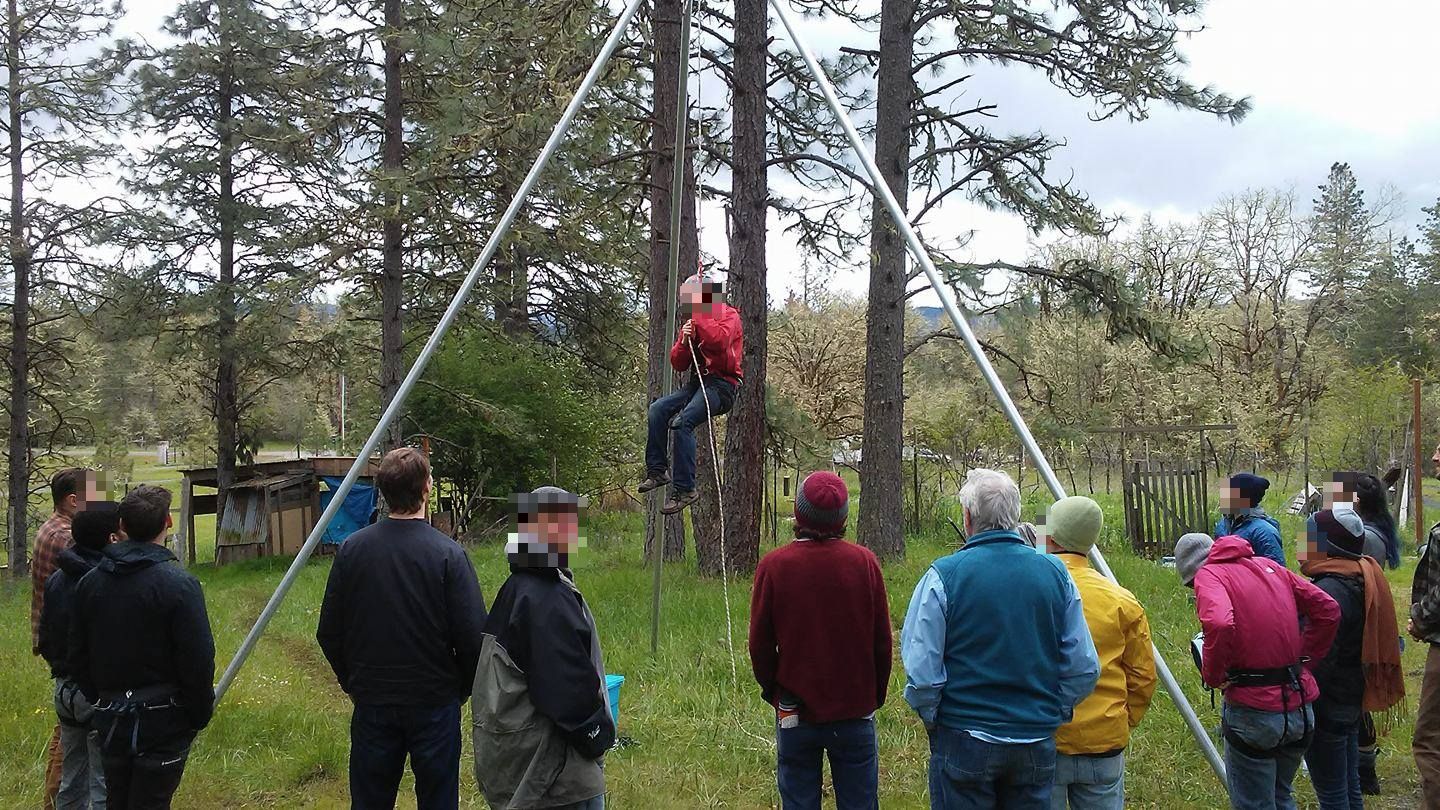
by DGR Editor | May 2, 2017 | Education
by Deep Green Resistance Eugene
Over Earth Day weekend, Deep Green Resistance members in Oregon hosted an advanced direct action training in rural western Oregon.
About 45 people attended from several surrounding states.
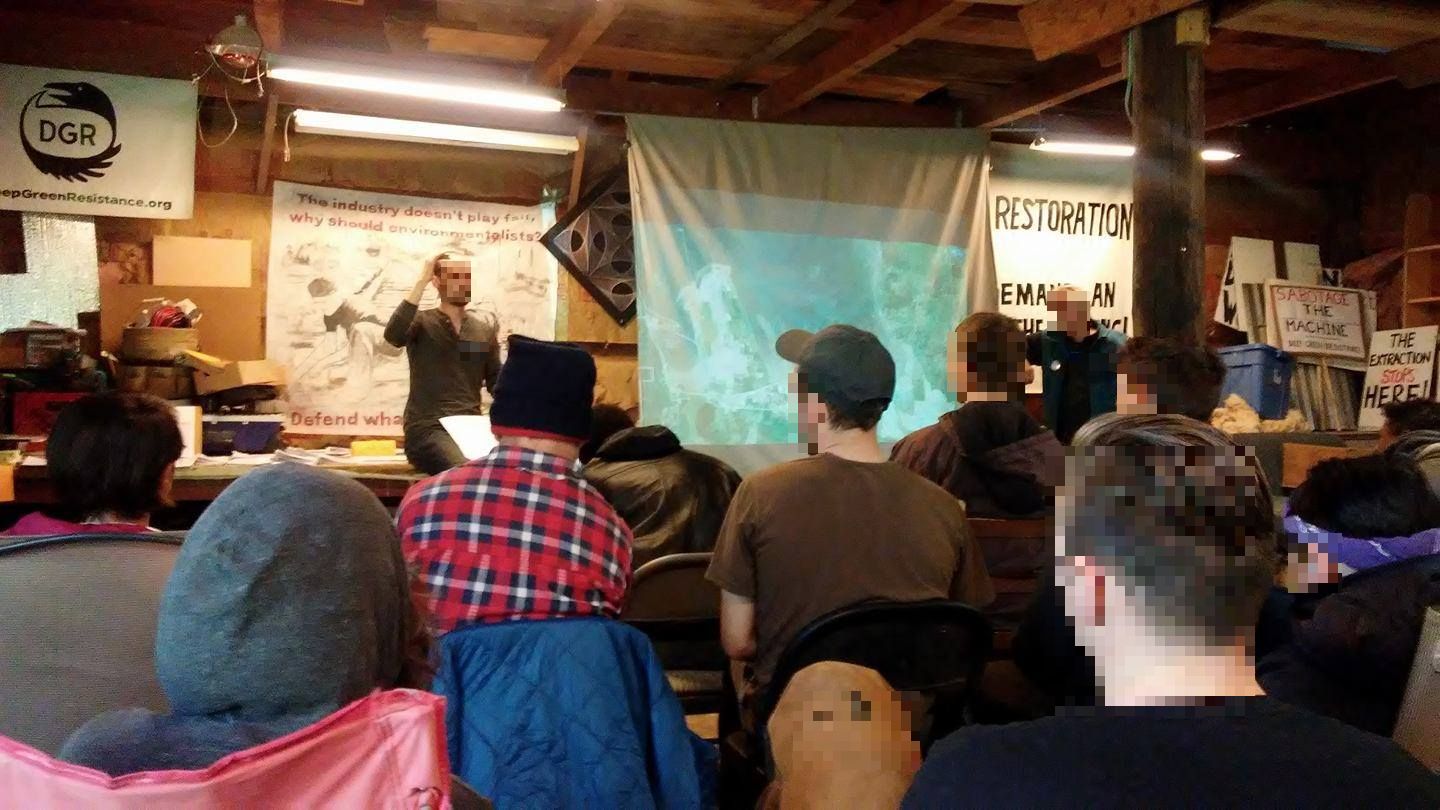
This workshop broke down critical factors and possible improvements for various recent and historical resistance actions and campaigns.
The training began with several anti-oppression sessions to help foster an equitable and safe environment for facilitators and participants, especially for people of color, women, indigenous people, and members of other oppressed and marginalized groups. These sessions, which included an introduction to radical feminism and a group activity around understanding privilege, aimed to inform the interpersonal dynamic and content of the training. This is also to help facilitate a more inclusive and comfortable organizing experience in our communities.
Other training sessions included:
• Campaign strategy
• Target selection
• Case studies in two recent direct actions from people involved in them
• Analysis of critical factors in other recent and historical resistance campaigns / actions
• Scouting for action
• Know your rights and legal briefing
• Art and resistance
• Media
• Various hard skills for blockades and direct action
• Communications and digital security
• Affinity groups
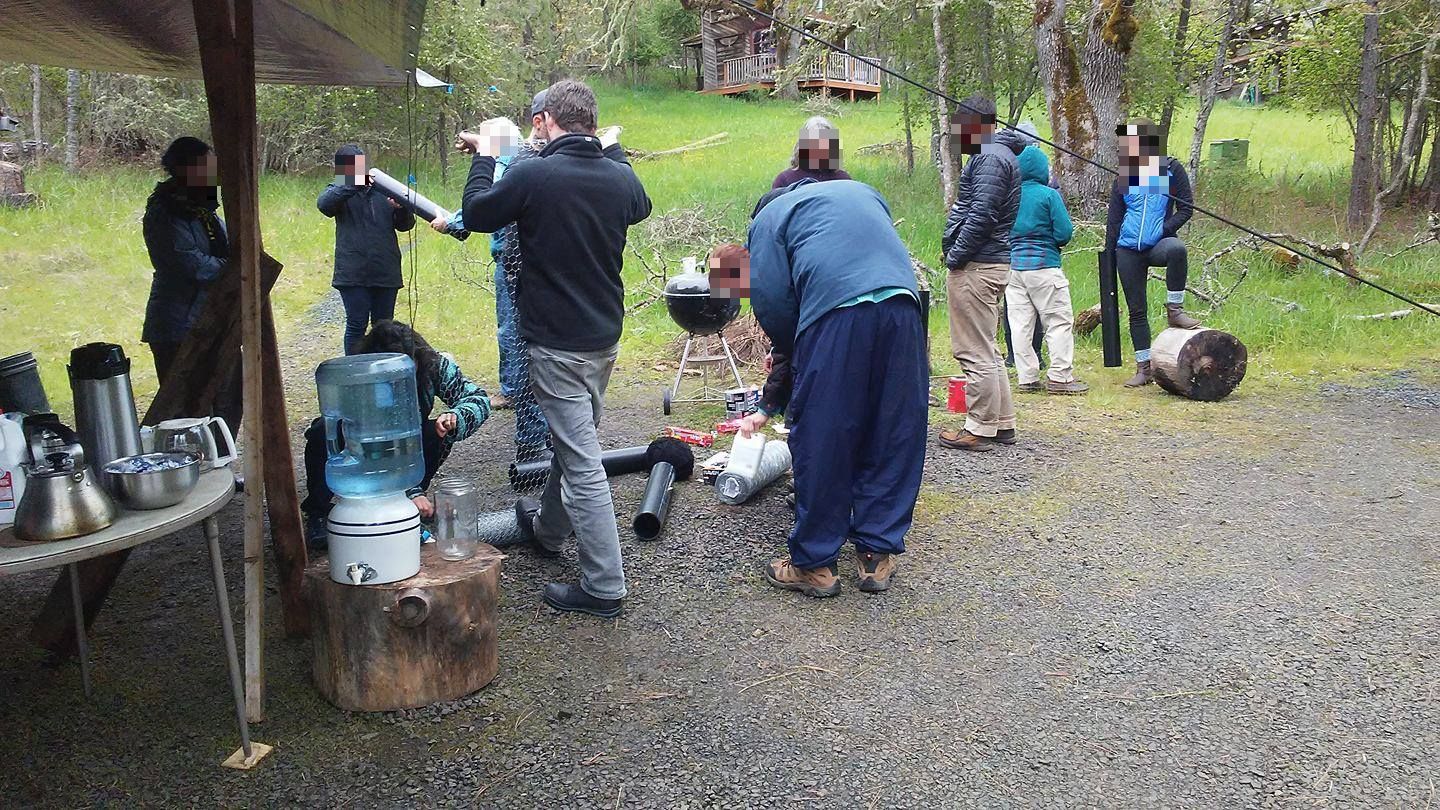
Experimentation with building materials for blockades.
Trainings like this play an important role in developing two critical elements in effective resistance: community and skills.
This sort of event would be impossible without financial support. To everyone who donates to Deep Green Resistance, is a monthly sustainer, or purchases gear from our website—thank you!
A few comments from attendees:
“Thank you… for such a comprehensive training in just a few days!”
“I considered not coming when I saw some militant photos on the DGR website, but I’m so glad I did. This training really debunked the myth of resistance activists being casually militant and violent people.”
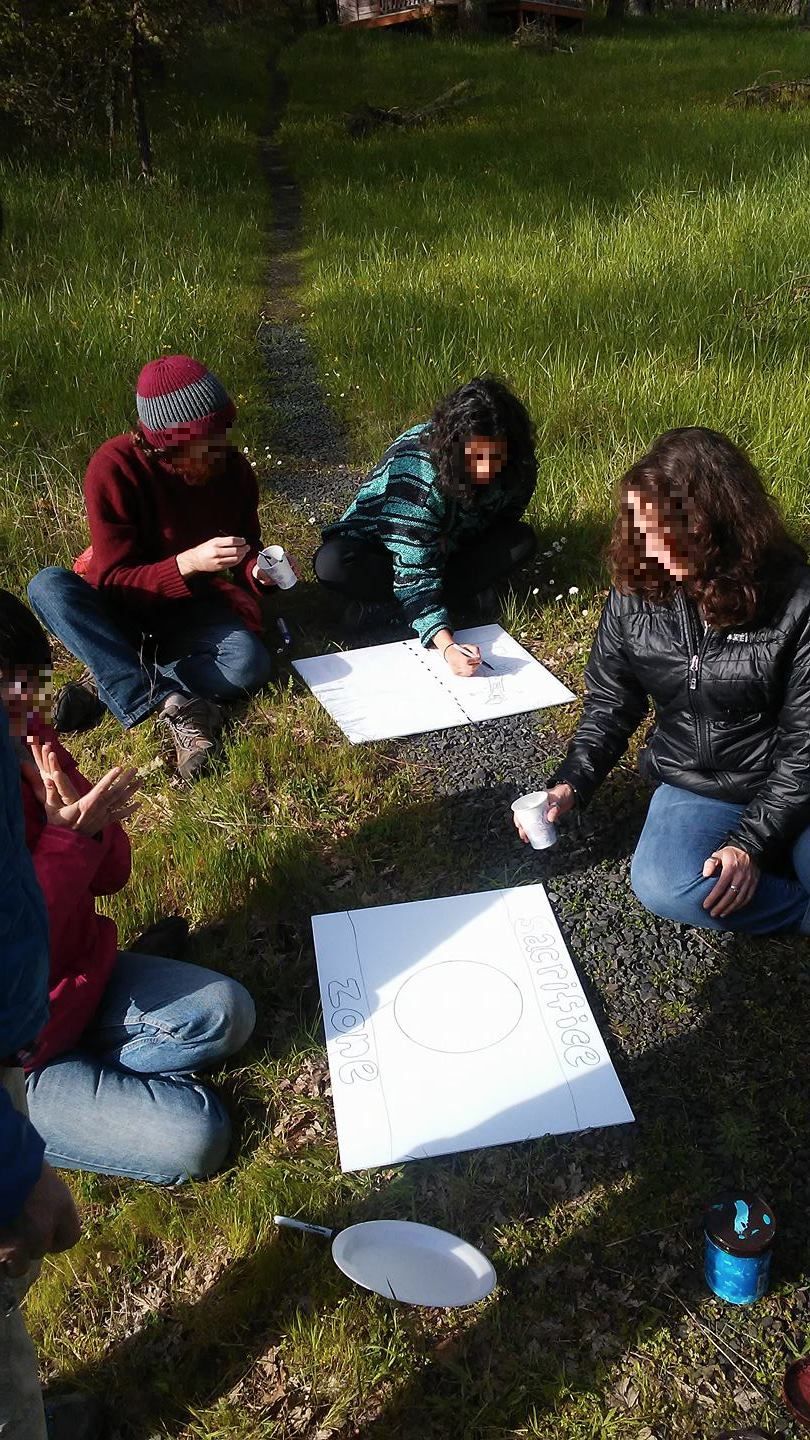
Artistic workshop after a long day sitting down inside.
“My daughter has been telling me for years about radical feminism and I never understood what she was talking about. I do now, somewhat, and I am aware of all I don’t know and hadn’t considered in terms of the climate crisis and potential steps I can take. I’m so glad I came.”
“I could spend weeks hearing and discussing the topics brought up on Saturday morning, and I learned a lot. The Privilege Walk was powerful and a great way to start the weekend. Thank you for the RadFem reading list and the matter-of-fact presentations on intersectional oppressions!”
“Awesome group of people at the training.”
“I’m home and full of inspiration… You have my deepest appreciation for the hours of hard work it took to make this weekend happen. The whole crew of you are simply wonderful, thank you for being dedicated enough to take bold actions and wise enough to do them prudently.”

Tripod and rope ascending workshop.
“The DA training offered an invaluable opportunity for DGR members and allies to meet in person, share ideas and skills, and build real community. Each new relationship felt like a door opening to our greater collective potential and previously unconsidered ideas. There is something magical in spending time together that cannot be quantified or explained. I can’t wait for the next get together and to see the inspiring ideas and actions that will surely come out of this training.”








